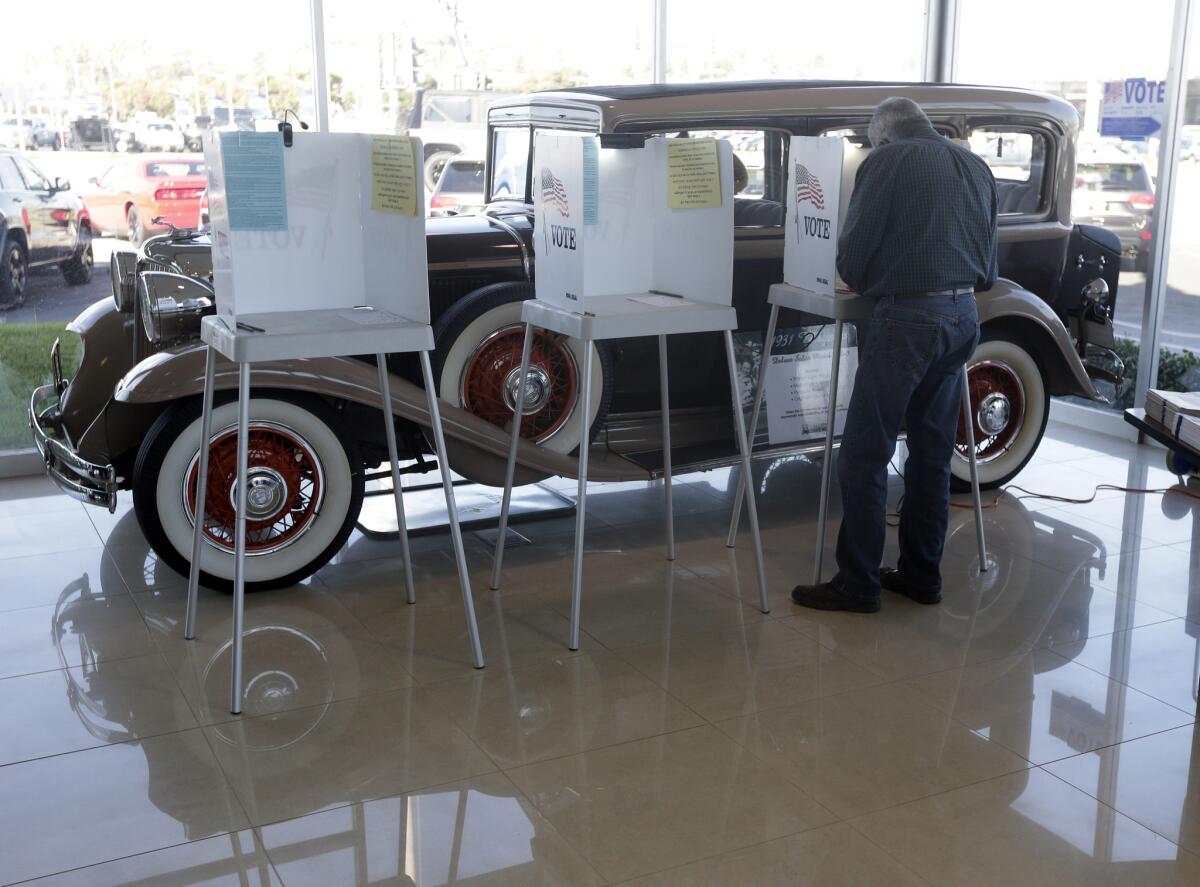Op-Ed: Give noncitizens the right to vote? It’s only fair

- Share via
The contemporary immigrant rights movement has commanded attention through civil disobedience, student walkouts and intensive lobbying. But there’s another tactic — increasing immigrant clout by allowing all noncitizens to vote — that also deserves serious consideration.
Many Americans understandably question why immigrants should be able to vote before they become U.S. citizens. They know citizenship is required for federal elections, and they attested to their status when they registered. But what most don’t know is that the right to vote in this country has never been intrinsically tied to citizenship. And even now, in a few jurisdictions and on some issues, noncitizens have a limited right to vote.
As it turns out, voting by noncitizens is as old as the Republic. From 1776 until 1926 in 40 states and federal territories, residents who weren’t citizens could vote in local, state, and sometimes federal elections. They also have held public office; Indiana and Louisiana elected noncitizen aldermen and coroners, for example. In a country where “no taxation without representation” was the rallying cry for revolution, and where government theoretically rests “on the consent of the governed,” allowing all residents to vote only makes sense.
Today, immigrants here legally and illegally work in every sector of the economy. They own homes and businesses, attend colleges and send children to schools. They pay billions in taxes each year, and make countless social and cultural contributions to their communities. They are subject to all the laws that govern citizens, serve in the military and even die defending the U.S. But most are without formal political voice.
Their numbers are staggering. According to the U.S. Census Bureau, more than 22 million adults in the U.S. are barred from voting because they lack U.S. citizenship. In some districts — and in some whole cities and towns — noncitizens make up 25% to 50% of voting-age residents. In Los Angeles they make up more than a third of the voting-age population; in New York City, they are 22% of adults. Such levels of political exclusion approximate the exclusion of women prior to 1920, African Americans before the Voting Rights Act of 1965 and 18-year-olds prior to 1971.
Sadly, America knows all too well what can occur when groups don’t have a formal political voice: discriminatory public policy and private practices — in employment, housing, education, healthcare, welfare and criminal justice.
Noncitizens suffer social and economic inequities, in part, because policymakers can ignore their interests. The vote is a proven mechanism to keep government responsive and accountable to all.
But why don’t they just become citizens? Most immigrants want to, but the average time it takes for the naturalization process is eight years and sometimes longer. That’s a long time to go without a vote.
Besides, many who are here legally are barred from pursuing citizenship by the terms of their visas; they are students or green card holders who are nonetheless members of their community who deserve a voice in its policies. And of course, those who are here illegally, who overstayed a visa or never had one have no practical pathway to citizenship.
But do noncitizens possess sufficient knowledge of our political system to vote responsibly? If political knowledge was a criteria for voting, many U.S. citizens would be out of luck, as public surveys regularly show. Moreover, as it is, a citizen can move from New York to Los Angles and register and vote within 30 days, even if he or she doesn’t know a thing about the candidates or ballot proposals. So why should literacy tests or restrictive residency requirements be able to disenfranchise noncitizen voters?
There are now a handful of U.S. jurisdictions where noncitizens have a right to vote in some elections. In six towns in Maryland since the 1990s, all residents (except felons serving sentences or those judged mentally incompetent by a court) can vote in local elections. Chicago permits all noncitizen parents of schoolchildren to vote in school district elections. In California, all parents can participate in “parent trigger” votes to change the administration of their children’s schools.
Next year, the New York City Council will take up a bill — which has broad political support — that would allow noncitizens lawfully residing in the U.S. to vote in local elections. In March, Burlington, Vt., voters will decide on a similar ballot proposition to let legal permanent residents vote in local elections. The District of Columbia has a similar bill pending.
The right to vote helps keep our democracy inclusive and fair, and resident voting is the next logical step toward creating a truly universal franchise. It is what America’s past and future as an immigrant nation requires. Noncitizen voting is the suffrage movement of our time.
Ron Hayduk, a professor of political science at Queens College, City University of New York, is the author of “Democracy for All: Restoring Immigrant Voting Rights in the United States.”
This op-ed is part of an ongoing exploration in Opinion of the meaning of citizenship in America today. For more, join us at latimes.com/citizenship and #21stCenturyCitizen. We’d love to hear from you. Share your thoughts, rebuttals and experiences with us at [email protected].
Follow the Opinion section on Twitter @latimesopinion
More to Read
A cure for the common opinion
Get thought-provoking perspectives with our weekly newsletter.
You may occasionally receive promotional content from the Los Angeles Times.










